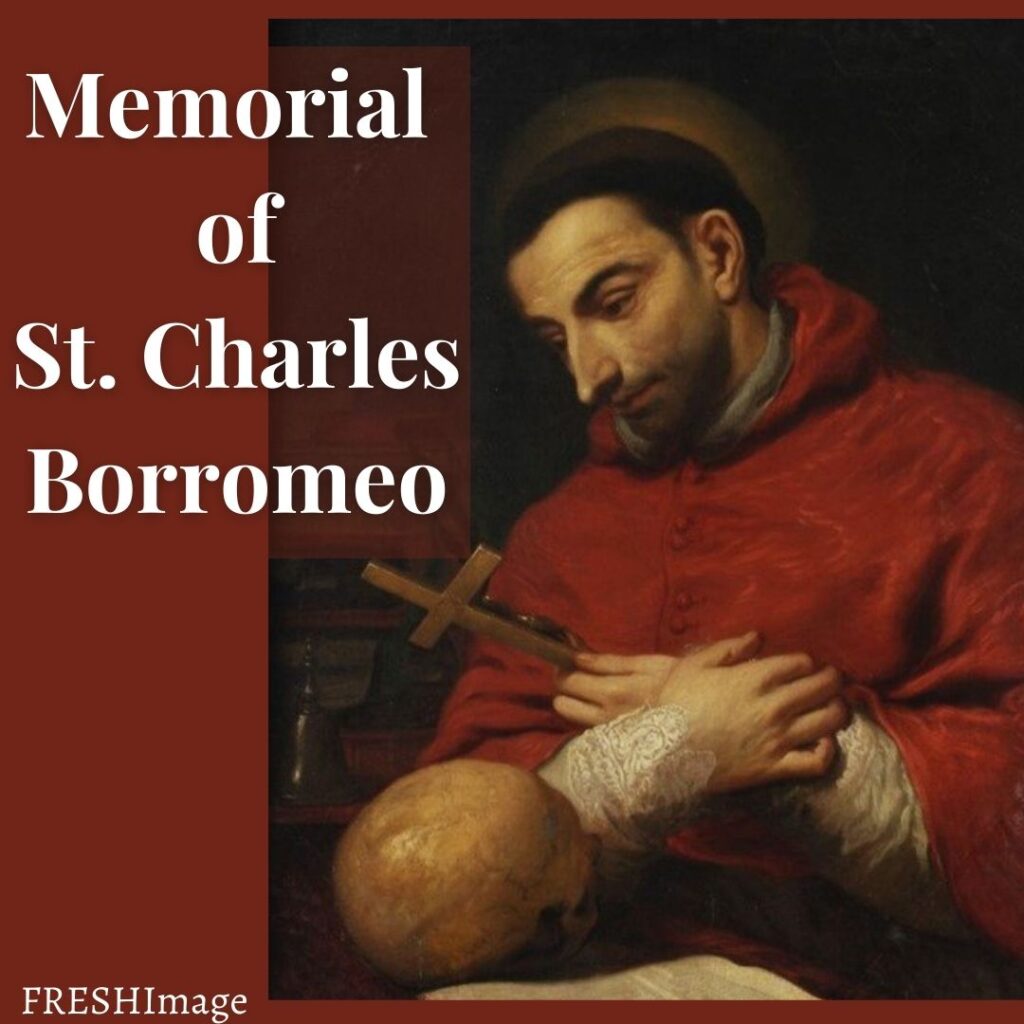
November 4
Happy Memorial of St. Charles Borromeo!
“Blessed are the pure in heart, for they will see God” (Mt. 5:8). This passage from the Beatitudes read this past weekend for the Solemnity of All Saints can in a very real way said to describe all of the saints celebrated by the Church. It denotes a singular focus, a willful drive toward the unum necessarium, i.e., the one thing necessary, love of God, which Christians live out in loving imitation of Jesus Christ. St. Charles Borromeo was blessed at a young age with an intense focus on the unum necessarium. Born in 1538 in Arona, Italy, Charles was related to the powerful Medici family, his uncle elected in 1559 to the Chair of St. Peter, Pope Pius IV. Despite being surrounded by the trappings of worldly and ecclesial power, Charles was precocious in sanctity. At the age of 12 he was given the honorary title of “commendatory” by a nearby Benedictine Abbey. Such a title came with a sizeable income, but already at this young age, Charles determined to offering the money to charity, especially to the care of the poor. Charles’ precocious nature seemingly expanded into all areas of his life, by the age of 21 he was doctor of both canon and civil law, and by the age of 27 he was archbishop of the illustrious episcopal see of Milan. Emblazoned on the center of his coat of arms is the word humilitas, related to the Latin for humility, and meaning lowliness and submissiveness.
We find this motto at the center of many of Charles’ writings on the Christian life. For Charles, the virtue of humility forms the basis of the Christian life of love, marking the beginnings of a life lived in the imitation of Christ. In a Sermon on Holy Thursday, Charles taught that “everything we find in the mystery of the Incarnation of Christ teaches the greatest humility and shows an immense love.” For Charles the Passion and the Eucharist are the two greatest demonstrations of Christ’s humble love, and in his reflections on the relation between the two, one sees a dynamic of exemplum et sacramentum (example and sacrament). For Charles these two must be held together as the failure of one denotes the distortion of the other. Thus, in the same sermon, Charles meditates on this dynamic saying of Our Lord: “he showed this admirable love as well in the Last Supper, instituting the Most Holy Sacrament of his Body…Moreover, this washing of feet…wondrously commends that same love of his to his own.” For Charles, Jesus exemplifies a eucharistic humility, if you will, in washing his disciples’ feet, leaving us a “splendid teaching and example to imitate.” In a real way, then, the example is a sacrament of the life of Christ given us in the sacrament of the Eucharist, the aim of which, Charles asserts, is to enable us to imitate this example. Thus, in a sermon for Corpus Christi, he writes:
It is the same Christ as in the primitive Church, the same Eucharist, the same strength as before. You will receive the same fruits as they did. But it is not enough to consume Christ, unless you lead a life in conformity with him. It is not enough to be filled up with the gifts of the Holy Spirit, unless they are put to use (Homily During the Mass of Corpus Christi, June 9, 1583).
In practicing what he preached by the grace of God, Charles serves as a timely example for us today. He was an avid proponent of Church reform, calling ecclesial leaders to see themselves as the servants of the faithful, and when a plague struck Milan in the 1570s, Charles dedicated himself to the care of the sick, divesting himself of his family’s wealth to feed as many as he could. In so doing, Charles reminded those around him and us today, of the unum necessarium, to love God which one simply cannot do without loving one’s neighbor.
St. Charles Borromeo, great exemplar of humble love, pray for us that we may be granted the grace to serve our neighbor in loving humility without counting the cost and so point those around us to the unum necessarium, the love of our God through, with and in Jesus Christ.
Your servant in Christ,
Tony Crescio is the founder of FRESHImage Ministries. He holds an MTS from the University of Notre Dame and is currently a PhD candidate in Christian Theology at Saint Louis University. His research focuses on the intersection between moral and sacramental theology. His dissertation is entitled, Presencing the Divine: Augustine, the Eucharist and the Ethics of Exemplarity.
Tony’s academic publications can be found here.
Charles was a descendant of nobility: the Borromeo family was one of the most ancient and wealthy in Lombardy, made famous by several notable men, both in the church and state.